Hot Rolled Alloy Bearing Steel Round Bars for Construction
- Loading Port:
- Tianjin
- Payment Terms:
- TT or LC
- Min Order Qty:
- 25 m.t.
- Supply Capability:
- 100000 m.t./month
OKorder Service Pledge
OKorder Financial Service
You Might Also Like
Product Description:
High Quality Bearing steel is used for manufacturing ball, roller bearing steel and rings. Bearing in work is under great pressure and friction, so have high demands bearing steel and hardness and resistance, and high elastic limit.
Bearing steels are used for ball and roller bearing applications and are comprised of low carbon steels and high carbon through harden able steel.
For example, bearing ring, steel rolling mill, machinery, 100Cr6 bearing steel ball is widely used in high-speed and low-noise bearing, bicycle, motorcycle, automobile, bags electronically.
Product Applications:
High Quality Hot Rolled Alloy Bearing Steel Round Bars are ideal for structural applications and are widely used in the construction of buildings and bridges, and the manufacturing, petrochemical, and transportation industries.
1. Steel round bar products is used in construction and a large number of architectural and engineering structures. And it can be used in production of handrail, windows, machinery, telecom and curtain wall.
2. It can be used in the fields like metal mines, cement plants, water coal slurry, power stations and chemical industry.
3. Besides, we can supply some especial material steel round bar that can be used for main shaft of steamer, hummer shank, with big section and supper force.
4. Recommended watchcase factory, screw factory and other cold stamping products industry use.
Product Advantages:
OKorder's High Quality Hot Rolled Alloy Bearing Steel Round Bars are durable, strong, and resist corrosion.
1. The steel in which the main interstitial alloying constituent is carbon in the range of 0.12–2.0%.
2. As the carbon percentage content rises, steel has the ability to become harder and stronger through heat treating; however it becomes less ductile.
3. Regardless of the heat treatment, higher carbon content reduces weld ability. In carbon steels, the higher carbon content lowers the melting point.
4. Quality should be in conformity with the specification of the manufacturer. Quantity and packing conditions should be in conformity with the term in the contract.
Main Product Features:
· Premium quality
· Prompt delivery & seaworthy packing (30 days after receiving deposit)
· Corrosion resistance
· Can be recycled and reused
· Mill test certification
· Professional Service
· Competitive pricing
Specifications of High Quality Hot Rolled Alloy Bearing Steel Round Bars
1. Grade: Q235, A36, SS400, S235JR
2. Feature: Unbreakable, grinding resistant and high impact value
3. Diameter: 8mm-150mm
4. Performance: Mainly for civil construction
5. Characteristics: Even hardness, no deformation, no breaking, no mal-roundness
6. Technique: Hot rolled
7. Mass: Mass (kg/m) = Diameter (mm) × Diameter (mm) × 0.00617
Packaging & Delivery of Mild Hot Rolled Steel Round Bars for Bults and Nults
Packaging Detail: All goods are packed in bundle with steel strips and shipped by break bulk vessel or container (depend on target market and different ports)
Delivery Detail: 45 days
Trade terms: FOB, CFR, CIF
MOQ: 25 tons per specification; we can negotiate the quantity if the specification is normal or we have stock of one specification.
Weight: The price invoicing on theoretical weight basis or actual weight basis depends on customer’s request.
Shipment: The shipment of bulk break or container is depends on customer’s request and the situation of the port of destination.
Documents given: Full set of original clean on board bill of lading; Original signed commercial invoice; Original packing list; Policy of insurance; Certificate of origin and what the target market needs.
Production Flow of High Quality Hot Rolled Alloy Bearing Steel Round Bars
Material prepare (billet) — heat up — rough rolling — precision rolling — cooling — packing — storage and transportation
FAQ:
Q1: The products are invoicing on theoritical weight or on actual weight?
A1: We can do it in both manners, according to the customers' request.
Q2: What is the normal tolerance of High Quality Hot Rolled Alloy Bearing Steel Round Bars?
A2: Normally 3%-5%, but we can also produce the goods according to the customers' requests.
Q3: How soon can we receive the product after purchase?
A3: Within three days of placing an order, we will begin production. The specific shipping date is dependent upon international and government factors, but is typically 7 to 10 workdays.

- Q:How does special steel contribute to the aerospace racing aftermarket industry?
- Special steel is an essential component in the aerospace racing aftermarket industry as it plays a significant role in enhancing the performance, durability, and safety of aircraft and racing vehicles. Firstly, special steel is used in the manufacturing of critical engine components, such as turbine blades, compressor discs, and shafts. These components must withstand extreme temperatures, pressures, and mechanical stress during operation. Special steel alloys, such as nickel-based superalloys, provide excellent heat resistance, high strength, and exceptional corrosion resistance, ensuring peak performance and reliability of the engine systems. Moreover, special steel is vital in the construction of airframe structures. The lightweight but high-strength properties of special steel alloys, such as titanium alloys, are crucial in reducing the overall weight of aircraft and racing vehicles. This weight reduction contributes to improved fuel efficiency, increased speed, and better handling capabilities, making it an indispensable material in the aerospace racing aftermarket. In addition, special steel is utilized in the production of landing gear systems, which are crucial for safe takeoffs, landings, and overall maneuverability. The landing gear must endure immense forces and shock loads during these operations. Special steel alloys, like chromium-molybdenum steel, offer exceptional toughness, fatigue resistance, and impact strength, ensuring the landing gear's reliability and longevity. Furthermore, special steel plays a crucial role in the manufacturing of aerospace racing aftermarket components, such as fasteners, bearings, and gears. These components require high strength, wear resistance, and dimensional stability to withstand the demanding conditions of racing and provide optimal performance. Special steel alloys, including stainless steel and tool steel, possess these desirable properties, ensuring the longevity and reliability of these crucial components. Overall, special steel's contribution to the aerospace racing aftermarket industry cannot be overstated. Its exceptional properties, including high strength, heat resistance, corrosion resistance, and fatigue resistance, enable the production of reliable, efficient, and high-performance aircraft and racing vehicles. Without special steel, the aerospace racing aftermarket industry would be unable to achieve the level of advanced technology, speed, and safety that it currently enjoys.
- Q:What are the challenges in machining special steel alloys?
- Special steel alloys pose several challenges when it comes to machining, primarily due to their unique properties and characteristics. The first major challenge is their high hardness, which is often enhanced through heat treatment to improve mechanical properties. As a result, traditional cutting tools wear out quickly or become dull, making it difficult to machine these alloys. Additionally, the high hardness increases the risk of tool breakage, leading to frequent tool changes and increased production downtime. Another challenge is the presence of abrasive elements in special steel alloys, such as chromium, tungsten, or vanadium. These elements can cause rapid tool wear and degradation, resulting in reduced cutting tool life and higher machining costs. Moreover, if not managed properly during the machining process, these abrasive elements can lead to poor surface finish and dimensional accuracy. Furthermore, special steel alloys have low thermal conductivity, making it challenging to dissipate the heat generated during machining. This can result in high temperatures at the cutting zone, causing thermal expansion and distortion of the workpiece. The heat also affects the cutting tool, reducing its efficiency and lifespan. Effective heat management is crucial to prevent workpiece deformation and maintain dimensional accuracy. Moreover, these steel alloys are prone to work hardening, meaning they become harder and more difficult to cut as the machining process progresses. Work hardening leads to increased cutting forces, tool wear, and reduced surface finish. To overcome this challenge, machining parameters such as cutting speed, feed rate, and depth of cut must be carefully optimized to avoid excessive work hardening. In conclusion, machining special steel alloys involves overcoming challenges such as high hardness, abrasive elements, low thermal conductivity, and work hardening. To address these challenges effectively, manufacturers need to use specialized cutting tools, efficient cooling and lubrication systems, optimize machining parameters, and carefully select machining strategies. By doing so, accurate and efficient machining of special steel alloys can be achieved.
- Q:How is special steel used in the medical manufacturing process?
- Special steel is used in the medical manufacturing process for various applications such as surgical instruments, orthopedic implants, and medical devices due to its exceptional properties such as corrosion resistance, biocompatibility, and strength. It is specifically designed and manufactured to meet the stringent requirements of the medical industry, ensuring the safety and effectiveness of healthcare products.
- Q:How is alloy steel used in the production of gears and shafts?
- Alloy steel is commonly used in the production of gears and shafts due to its high strength, durability, and resistance to wear and fatigue. The addition of various alloying elements, such as chromium, nickel, and molybdenum, enhances the material's mechanical properties, making it suitable for heavy-duty applications. Alloy steel gears and shafts can withstand high loads, transmit torque efficiently, and provide reliable performance, ensuring smooth operation and prolonged lifespan in various industries, including automotive, aerospace, and manufacturing.
- Q:What are the different surface coating methods used for special steel?
- There are several surface coating methods used for special steel, including electroplating, hot-dip galvanizing, powder coating, and PVD (Physical Vapor Deposition) coating. Each method provides unique properties such as corrosion resistance, improved aesthetics, and enhanced durability, depending on the specific requirements of the steel application.
- Q:How does special steel contribute to the aerospace racing industry?
- Special steel plays a crucial role in the aerospace racing industry by offering superior strength, durability, and performance characteristics that are essential for the demanding conditions and requirements of high-speed racing. One of the primary contributions of special steel to the aerospace racing industry is its ability to withstand extreme temperatures and pressures. Special steel alloys, such as nickel-based superalloys, are specifically designed to maintain their mechanical properties under high temperatures, making them ideal for the intense heat generated during racing. These alloys exhibit excellent creep resistance, allowing the components to withstand prolonged exposure to elevated temperatures without deformation or failure. Moreover, special steel alloys possess exceptional strength-to-weight ratios, providing a competitive advantage in the aerospace racing industry. The high strength of these alloys allows for the design and construction of lighter and more efficient racing components, such as engine parts, landing gears, and structural elements. This reduces the overall weight of the aircraft, enhancing its performance and speed while maintaining structural integrity and safety. Additionally, special steel offers excellent corrosion resistance, which is vital in the aerospace racing industry. The harsh conditions experienced during racing, including exposure to moisture, chemicals, and atmospheric elements, can lead to corrosion and deterioration of critical components. Special steel alloys, such as stainless steel, are highly resistant to corrosion, ensuring the longevity and reliability of the racing aircraft. Furthermore, special steel's unique metallurgical properties, such as high fatigue and fracture resistance, contribute to the safety and reliability of the aerospace racing industry. The high fatigue strength of these alloys allows them to withstand repeated loading and unloading cycles without developing cracks or failures. This is crucial in high-speed racing, where components are subjected to significant stress and strain. Special steel's exceptional fracture toughness also ensures that any potential cracks or flaws do not propagate catastrophically, minimizing the risk of catastrophic failures during racing. In conclusion, special steel plays a pivotal role in the aerospace racing industry by offering superior strength, durability, and performance characteristics. Its ability to withstand extreme temperatures, provide excellent strength-to-weight ratios, resist corrosion, and exhibit high fatigue and fracture resistance makes it an indispensable material for the construction of racing aircraft components. The use of special steel in the aerospace racing industry ultimately enhances the performance, speed, safety, and reliability of racing aircraft, pushing the boundaries of aerospace technology and propelling the industry forward.
- Q:What are the limitations of welding special steel?
- There are several limitations associated with welding special steel. Firstly, special steels often have high carbon content or alloying elements, which can lead to increased susceptibility to cracking during the welding process. Additionally, special steels may have unique microstructures, such as high hardness or brittleness, which can pose challenges in achieving proper weld penetration and joint strength. Furthermore, the heat input required for welding special steels can result in distortion or warping of the workpiece, requiring additional post-welding processes to correct. Finally, special steels may require specific pre-welding preparations, such as preheating or special welding consumables, which can increase the complexity and cost of the welding process.
- Q:What are the specific requirements for special steel used in the railway sector?
- The specific requirements for special steel used in the railway sector are crucial for ensuring the safety, durability, and efficient operation of the railway infrastructure. Some of the key requirements include: 1. High strength: Special steel used in the railway sector must possess exceptional strength to withstand heavy loads, vibrations, and impacts. This is crucial for maintaining the structural integrity of tracks, bridges, and other components. 2. Wear resistance: Railway tracks and wheels experience significant wear due to continuous contact and friction. Special steel must have excellent wear resistance to minimize the need for frequent maintenance and replacement. 3. Fatigue resistance: The constant cyclic loading experienced by railway components demands high fatigue resistance in the steel. This allows them to withstand repetitive stress and prevents the occurrence of fatigue failures. 4. Corrosion resistance: Railway infrastructure is exposed to various environmental conditions, such as moisture, extreme temperatures, and chemicals. Special steel must possess good corrosion resistance to prevent rusting and degradation, ensuring a longer service life. 5. Heat resistance: In certain applications, such as rail joints and fasteners, special steel is subjected to high temperatures due to friction and stresses. The steel must have good heat resistance to maintain its mechanical properties under such conditions. 6. Weldability: Special steel used in the railway sector should have good weldability to enable efficient and reliable joining of components during manufacturing and maintenance processes. 7. Ductility and toughness: The steel must exhibit sufficient ductility and toughness to absorb energy and resist fracture in the event of a collision or impact, ensuring passenger safety. 8. Dimensional stability: Special steel used in the railway sector must maintain its dimensional stability under varying temperatures and loads to prevent deformation and ensure proper alignment of tracks and components. Meeting these specific requirements for special steel in the railway sector is essential for ensuring the safety, reliability, and longevity of railway infrastructure, contributing to the smooth operation of the entire transport network.
- Q:How is stainless steel used in the production of kitchen utensils?
- Stainless steel is commonly used in the production of kitchen utensils due to its durability, corrosion resistance, and aesthetic appeal. It is used to make various utensils such as knives, forks, spoons, pots, pans, and cooking tools. The stainless steel material ensures that these utensils can withstand frequent use, resist rust and staining, and are easy to clean, making them ideal for use in the kitchen.
- Q:What are the applications of special steel in the aerospace industry?
- Special steel has numerous applications in the aerospace industry due to its unique properties. It is extensively used in the manufacturing of aircraft components such as engine parts, landing gears, and structural elements. Special steel offers high strength, excellent corrosion resistance, and exceptional heat resistance, making it ideal for withstanding extreme conditions experienced during flight. Additionally, its lightweight nature helps reduce the overall weight of the aircraft, leading to improved fuel efficiency and performance. Overall, special steel plays a crucial role in enhancing the safety, durability, and efficiency of aerospace equipment.
1. Manufacturer Overview |
|
|---|---|
| Location | |
| Year Established | |
| Annual Output Value | |
| Main Markets | |
| Company Certifications | |
2. Manufacturer Certificates |
|
|---|---|
| a) Certification Name | |
| Range | |
| Reference | |
| Validity Period | |
3. Manufacturer Capability |
|
|---|---|
| a)Trade Capacity | |
| Nearest Port | |
| Export Percentage | |
| No.of Employees in Trade Department | |
| Language Spoken: | |
| b)Factory Information | |
| Factory Size: | |
| No. of Production Lines | |
| Contract Manufacturing | |
| Product Price Range | |
Send your message to us
Hot Rolled Alloy Bearing Steel Round Bars for Construction
- Loading Port:
- Tianjin
- Payment Terms:
- TT or LC
- Min Order Qty:
- 25 m.t.
- Supply Capability:
- 100000 m.t./month
OKorder Service Pledge
OKorder Financial Service
Similar products
New products
Hot products
Related keywords





























